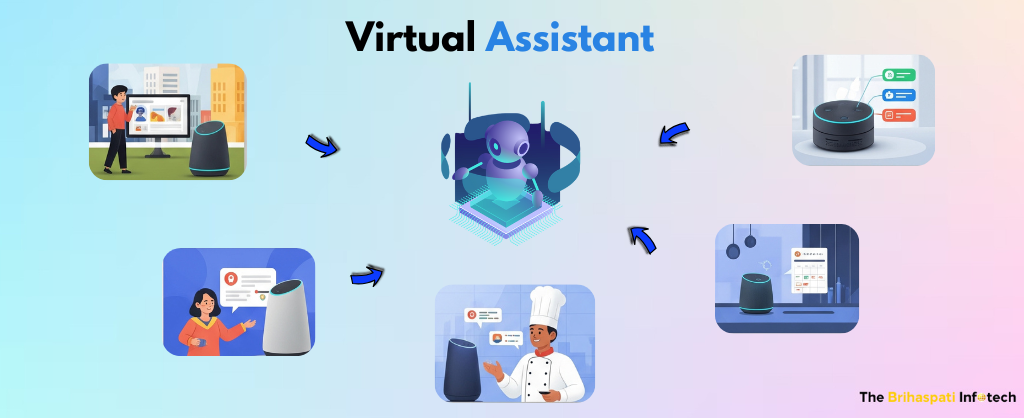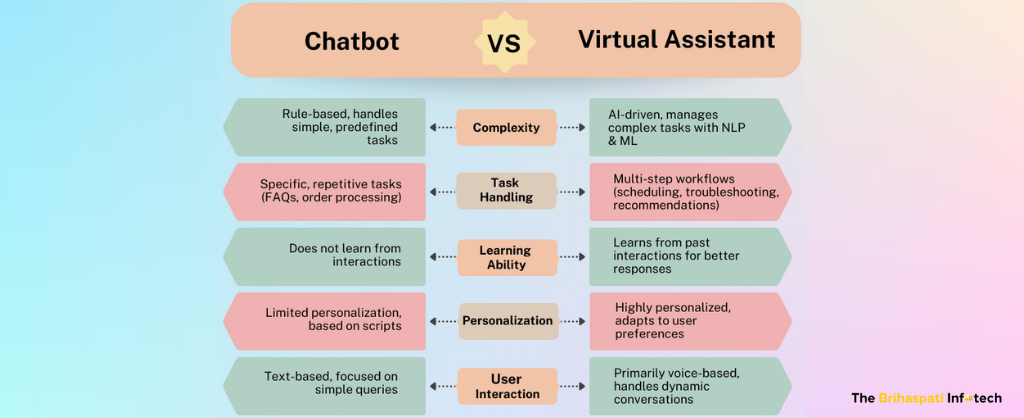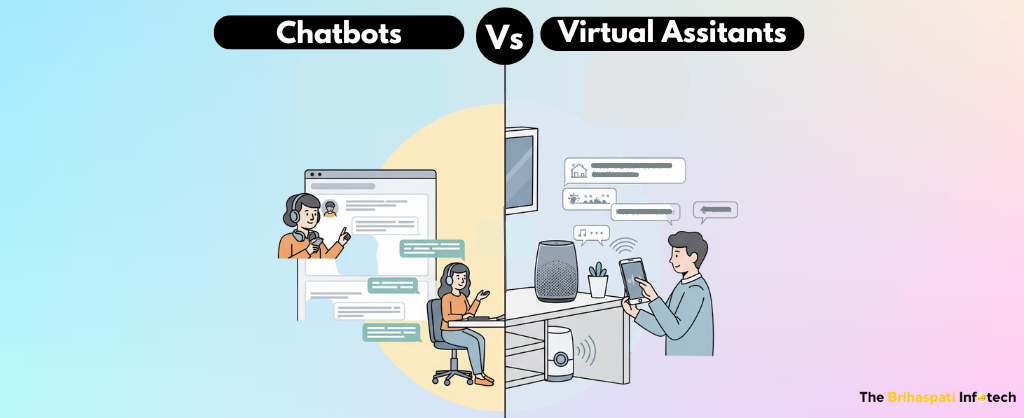Conversational AI Chatbot vs Assistants is not just wordplay, it’s strategy. Businesses are racing to automate customer interactions, internal processes, and decision-making support. Thus, clarity about the functional and strategic differences between Conversational AI solutions is essential.
With the global conversational AI market projected to skyrocket from $12.24 billion in 2024 to $61.69 billion by 2032, the shift is real. There can be massive migration towards AI-driven customer interaction.
In this article, we’ll break down the key differences between intelligent virtual assistants and custom AI chatbots. You’ll know which one fits your business best—and why.
What is a Chatbot?
Chatbots are AI-powered software mimicking human chats which can be in text or voice form. It is mostly employed for customer support, services, or engagement on websites, mobile applications, and messaging platforms.
Powered by natural language processing (NLP), they parse queries, fire back replies in real-time. Their responses are either pre-fed or they use machine learning to improve over the period of time.

There are two broad categories of chatbots:
- Rule-based chatbots: These are straightforward bots that stick to pre-defined commands. They are perfect for repetitive tasks such as answering FAQs or scheduling appointments.
- AI chatbots: These are intelligent bots. They employ machine learning and natural language processing (NLP) to understand a broader spectrum of user input. They learn from past interactions and get sharper and context-sensitive.
Ready to automate with chatbots? Check out our AI chatbot development services.
What is an Intelligent Virtual Assistant?
Virtual assistants (VAs), or AI assistants, are smart software agents. They tackle tasks, answer queries, and engage users through natural language. Unlike basic chatbots, intelligent virtual assistants can handle context, multi-turn conversations, and complex workflows with ease.
Driven by technologies such as natural language processing (NLP), machine learning development services (ML), and voice recognition, they’re built for dynamic automation.

What can a virtual assistant do? Plenty:
- Manage calendars, Schedule meetings.
- Fetch data: Web searches, quick and accurate.
- Control tools. Enterprise systems, smart devices—integrated.
- Automate processes: Streamline repetitive tasks across teams.
Popular examples include Google Assistant, Amazon Alexa, and Apple Siri. But companies now craft custom intelligent virtual assistants to manage internal ops, customer service or even decision-making.
Virtual assistants differ from rule-based chatbots as they are made for context-aware, dynamic engagement and thus best suit companies looking for scalable, smart automation.
Conversational AI Chatbot vs Assistants: What is the difference?
They might sound similar—and both talk to users—but they’re built very differently. A chatbot handles basic tasks with scripted logic. A virtual assistant, on the other hand, thinks a little deeper. It understands context, adapts, and even learns over time. Knowing the difference isn’t just technical—it’s strategic. Proper knowledge will help you choose the right tool for your business.

Here are the 5 important points that best describe how conversation AI solutions like chatbots and virtual assistants differ from each other:
1. Complexity
- Chatbots stick to rules. Simple tasks, pre-set scripts.
- Virtual assistants are AI-powered. They tackle complex stuff with machine learning and NLP.
2. Task Handling
- Chatbots nail repetitive jobs—such as responding to FAQs or processing orders.
- Virtual assistants juggle multi-step workflows—scheduling, suggestions, real-time alerts.
3. Learning Ability
- Chatbots don’t evolve. They stick to the script.
- Virtual assistants learn fast. Every interaction makes them sharper, more interactive.
4. Personalization
- Chatbots are basic with limited, scripted responses.
- Virtual assistants offer personalization. They store your preferences, tailor the experience.
5. User Interaction
- Chatbots tend to use text-based interaction for basic queries and quick answers.
- Virtual assistants often utilise voice interaction and conduct more complex, context-driven conversations.
Conversational AI Chatbot vs Assistants: Which AI Solution Should You Pick?
Choice between AI chatbots and virtual assistants is critical. Each serves a different purpose, depending on your business goals, budget, and customer expectations. One is built for speed and simplicity. The other for depth and intelligence. Not sure which one fits your needs best? Let’s break it down so you can make the right call with confidence.
When should you choose a Chatbot?
Chatbots are your go-to for automating mundane, repetitive conversations. They are cost-effective and efficient. Perfect for businesses looking to streamline without breaking the bank. Select a chatbot if your company:
- Gets flooded with routine questions: Stuff like pricing, FAQs, order tracking.
- Needs quick setup: Tight deadlines and limited tech resources.
- Runs on a tight budget: Affordable support tool with maximum impact.
- Want to start small: Automate now, scale up later as needs evolve.
- Needs basic 24/7 support. Even when your team’s asleep, the bot’s working.
When should you choose a Virtual Assistant?
Looking for more than canned responses? Go with an AI assistant. It’s smart, flexible, and gets better with time.
Choose a Virtual assistant if your business:
- Handles complex queries: Stuff that needs real understanding, not just button-pushing.
- Serves a big or diverse audience: Different people, different needs, one smart system.
- Needs app integrations: CRMs, calendars, helpdesks and more.
- Wants smarter support: Personalized, on-brand, and always learning.
- Built for scale: Planning to grow? This can grow with you.
Intelligent Virtual assistants aren’t just helpful—they’re strategic. They take on the heavy lifting so your team can focus on what matters.
Real-World Examples: Conversational AI Chatbot vs Assistants in Action
Chatbot in eCommerce
An eCommerce development company can deploy a chatbot to handle customer queries quickly and efficiently without human intervention. Customers ask about products. The bot responds. Need to track an order? Done. Want to buy something? The chatbot guides them through. It’s automation at scale—with zero burnout.
Virtual Assistant in AI Services
For instance, an Artificial Intelligence Development Company can use a virtual assistant to manage client projects. It schedules meetings, sends updates and gives real-time feedback. No human agent in the loop. Just smart, seamless support and clients stay informed. Workflow? Streamlined. Satisfaction? Boosted.
Implementation Checklist: Conversational AI Chatbot vs Assistants
Before jumping in, pause. Think about what your business really needs. Here’s a checklist to keep in mind before getting started.
- Customer interactions: Quick FAQs or complex, multi-step conversations? Know the difference—it matters.
- Query volume: Getting flooded with messages? You’ll want something that works 24/7.
- Budget: Testing the waters or going all-in? Your spend should match your ambition.
- Scalability: Growing fast? Don’t build on tech you’ll outgrow in six months.
- Integrations: Need to hook into HubSpot, Jira, Slack, or others? Make sure it all plays nice.
Building smart AI solutions isn’t a solo mission. Partner with a trusted AI or web development team to pick the right tools, streamline integration, and keep your systems running smoothly.
Looking for a custom AI chatbot? Connect with our expert AI chatbot development team to build scalable, intelligent solutions that drive results.
Conversational AI Chatbot vs Assistants: Future Trends
Conversational AI chatbots and virtual assistants are growing up. They are no longer just automation tools. They’re getting smarter, context-aware and more ready for the future. Here’s what’s coming:
Generative AI Integration
Transformer models like GPT-4 are taking over. You can build a Chatbot using OpenAI and RAG. They offer more natural and creative conversation. They have a capacity to handle multi-turn dialogs and generate personalized content.
Multimodal Capabilities
Future assistants handle it all—Text, voice, images, video. It enables seamless interactions across Mobile apps, AR/VR. This is especially relevant for industries like healthcare, education, and retail.
Contextual Memory & Personalization
Intelligent Virtual assistants keep tabs on you. They can remember user preferences, past chats and behavior patterns. Chatbots are also stepping up. They can offer hyper-personalized experiences such as mood-based music recommendations or proactive support based on browsing history.
Advanced Voice Interfaces
Voice assistants are getting sharper in understanding accents, dialects, and background noise. A seamless voice workflow is expected in smart homes, cars and enterprises.
Multi-Bot Ecosystems
Businesses are going modular with specialized chatbots for every job—returns, product help, shipping. A central AI assistant runs the show intelligently.
Ethics, Privacy & Regulation
AI is everywhere. This makes data transparency and bias mitigation top priorities. Decentralized assistants can give more privacy and control.
Omnichannel & Messaging Platforms
Conversational AIs are not restricted to websites or apps. Businesses are switching to messaging platforms. WhatsApp AI Chatbots are now handling product questions, booking confirmations and order tracking along with contextual replies in real time.
Frequently Asked Questions
Chatbots focus on specific and repetitive tasks like FAQs, order tracking. While intelligent Virtual assistants are more advanced. They handle complex workflows, learn from interactions, and offer personalized experiences.
Looking to implement a smart AI solution in your business? Our conversation AI solutions can be the answer. Let’s Talk.
If you have got tons of routine queries that need quick and cost-effective automation. Chatbots are your pick. Perfect for FAQs, order processing, or 24/7 basic support. Start small, scale later.
Get in touch with our AI chatbot development company & get a custom chatbot for your business.
Yes. Multi-bot ecosystems are trending. In this case, there will be specialized chatbots to tackle niche tasks—returns and product help. In addition, there will be a central virtual assistant coordinating routing queries for maximum efficiency.
Looking for AI solutions for your business? Let’s talk
Yes. WhatsApp AI chatbots can handle inquiries, bookings and product tracking. They offer rich media support that meets customers where they’re at—eCommerce, travel or services.
Choosing the Right Solution: Conversational AI Chatbot vs Assistants
AI Chatbots and virtual assistants both bring serious value—but they serve different purposes.
If you’re looking for quick wins, cost-effective automation, and basic support, chatbots are your go-to. Need deeper personalization, smarter workflows, and long-term scalability? Virtual assistants are the way forward.
The key is alignment. Match the solution to your business goals, user needs, and growth strategy.
Whether you’re just starting out or scaling up, conversational AI solutions are no longer optional—they are essential.
Ready to build the right solution? Partner with our expert Artificial Intelligence Development team and turn conversations into conversions.
Stay Tuned for Latest Updates
Fill out the form to subscribe to our newsletter





